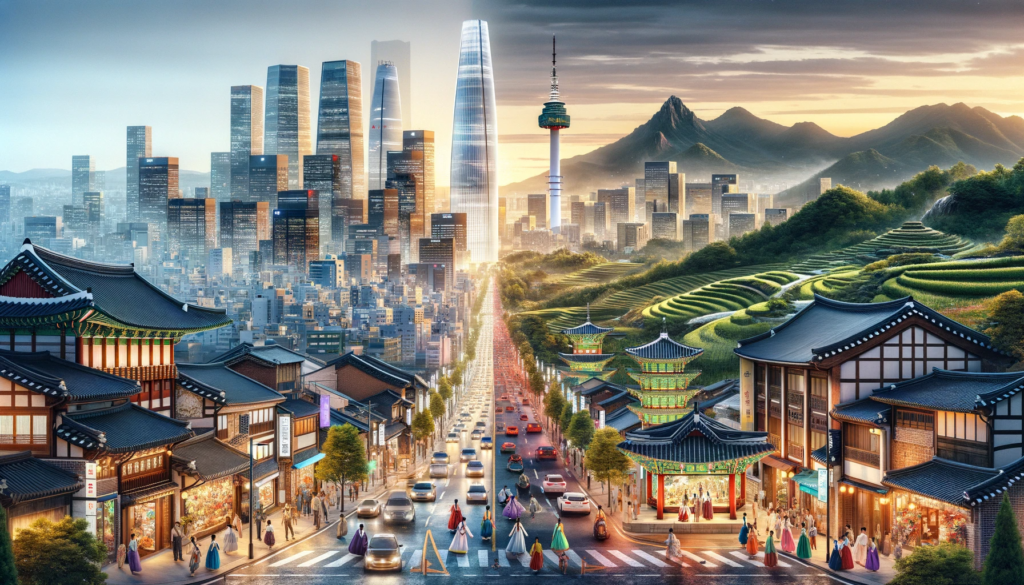South Korea is a nation that has rapidly transformed from post-war devastation to becoming a global leader in technology, culture, and innovation. It continues to face new challenges and opportunities in the 21st century.
National and Public Holidays for South Korea 2025
- New Year’s Day is on Wednesday, January 1st.
- Seollal (Korean New Year) is from Tuesday, January 28th to Thursday, January 30th.
- March 1st Movement Day is on Saturday, March 1st.
- March 1st Movement Day Holiday is on Monday, March 3rd.
- Children’s Day is on Monday, May 5th.
- Buddha’s Birthday is on Monday, May 5th.
- Memorial Day is on Friday, June 6th.
- Liberation Day is on Friday, August 15th.
- National Foundation Day is on Friday, October 3rd.
- Chuseok (Korean Thanksgiving) is from Sunday, October 5th to Tuesday, October 7th.
- Hangeul Day is on Thursday, October 9th.
- Christmas Day is on Thursday, December 25th.
National and Public Holidays for South Korea 2024
- New Year’s Day: Monday, 1 January 2024
- Seollal (Korean Lunar New Year): Friday, 9 February 2024, to Sunday, 11 February 2024
- March 1st Movement Day: Friday, 1 March 2024
- Children’s Day: Sunday, 5 May 2024
- Buddha’s Birthday: Wednesday, 15 May 2024
- Memorial Day: Thursday, 6 June 2024
- Liberation Day: Thursday, 15 August 2024
- Chuseok (Korean Thanksgiving Day): Monday, 16 September 2024, to Wednesday, 18 September 2024
- National Foundation Day: Thursday, 3 October 2024
- Hangeul Day (Korean Alphabet Day): Wednesday, 9 October 2024
- Christmas Day: Wednesday, 25 December 2024

Facts and Informations about South Korea
- Population: 48.3 million (UN, 2009)
- Capital: Seoul
- Area: 99,313 sq km (38,345 sq miles)
- Money: won
- Internet domain: .kr
- International dialling code: +82
History
- Ancient Kingdoms: Known for its historic Three Kingdoms period, where the kingdoms of Goguryeo, Baekje, and Silla vied for control, leading to the later unification under Silla.
- Joseon Dynasty and Japanese Occupation: The Joseon Dynasty, beginning in the 14th century, set a foundation for modern Korean culture. Korea then endured Japanese occupation from 1910 until 1945.
- Korean War and Division: Post World War II, Korea was divided into North and South, leading to the Korean War (1950-1953). South Korea emerged as a separate nation, officially known as the Republic of Korea.
Geography
- Location: Located on the Korean Peninsula in East Asia, South Korea is bordered by North Korea to the north, with coasts along the Yellow Sea and the Sea of Japan (East Sea).
- Terrain: Predominantly mountainous, with coastal plains in the west and south. The country is known for its scenic natural beauty, including numerous islands and national parks.
- Climate: A temperate climate with four distinct seasons, including a monsoon period in the summer.
Culture
- Rich Cultural Heritage: Steeped in Confucian tradition, with a rich history in arts, music, and literature. Korean culture has been gaining international popularity, especially through K-pop and Korean cinema.
- Traditions and Festivals: Celebrates traditional festivals such as Chuseok (harvest festival) and Seollal (Lunar New Year), along with modern cultural events.
- Cuisine: Known for its diverse and flavorful cuisine, including dishes like kimchi, bibimbap, and Korean barbecue.

Economy
- Rapid Industrialization: Known for its remarkable economic growth from the 1960s onwards, often referred to as the “Miracle on the Han River.”
- Technological and Industrial Hub: A leading global player in technology, electronics (Samsung, LG), automotive (Hyundai, Kia), and shipbuilding industries.
- Innovation and R&D: Strong focus on innovation, research, and development, with significant investments in education and technology.
Society
- Demographics: A homogeneous population, with a high urbanization rate. Major cities include Seoul (the capital), Busan, and Incheon.
- Education: Emphasizes a rigorous education system, with high academic standards and competitive examinations.
- Healthcare and Social Issues: Advanced healthcare system. Social issues include an aging population, work-life balance, and gender equality.
Environmental Focus
- Urban Environment and Green Policies: Rapid urbanization has led to environmental challenges. Efforts are underway to promote sustainable development, reduce pollution, and increase green spaces.
- Renewable Energy: Investing in renewable energy sources and technologies as part of its commitment to reducing greenhouse gas emissions.
Government and Politics
- Democratic Governance: A democratic republic with a president as the head of state and a unicameral legislature. Vibrant political scene with active civic participation.
- Inter-Korean Relations: Relations with North Korea remain a central issue in politics and foreign policy, with efforts towards peace and reunification.
Tourism
- Cultural and Historical Sites: Attractions include ancient palaces like Gyeongbokgung, historic villages like Bukchon Hanok Village, and cultural sites in Gyeongju.
- Modern Attractions: Dynamic urban culture in cities like Seoul, with cutting-edge technology, fashion, and entertainment.

